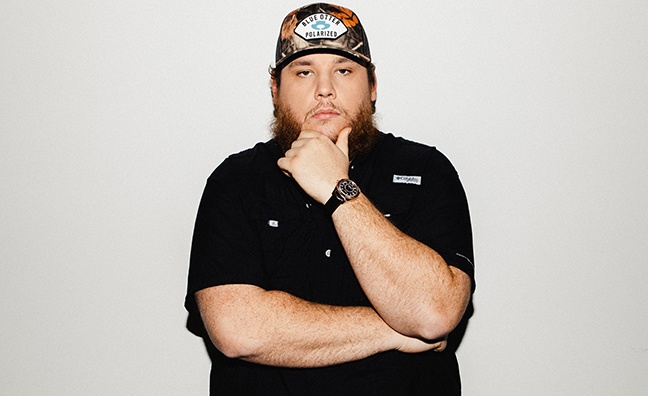Five years ago, Luke Combs – who was due to headline this weekend's C2C Festival, prior to its postponement – was an independent artist trying to find his way. In 2020, he is a country music phenomenon.
Not only did Combs’ 2016 debut This One’s For You go triple platinum and become the most streamed country album of 2019, it also tied Shania Twain’s record for the longest reign at No.1 on the Country Albums Chart, spending 50 weeks on top. While its follow-up What You See Is What You Get is only a few months old by comparison, since its November 2019 release it has already hit No.1 on the all-genre US chart and enjoyed the largest streaming week for a country album ever. Combs now has over five billion streams to his name.
For our cover feature we spoke to Combs – plus River House Artists’ Lynn Oliver-Cline who, alongside Chris Kappy, co-manages him; and Randy Goodman, chairman & CEO at Sony Music Nashville – about his remarkable journey so far, including transitioning from life as an independent artist, coping with success and why keeping it real has worked so well for him.
Combs, one of the most successful artists at radio, also weighed in on the inequality of opportunities for female artists on the country airwaves in the US, and what male artists can do to help…
“I’ve got Ashley McBryde out with me right now and I’m a huge fan,” Combs told Music Week. “If I were to bring just female artists out, obviously that would help, but it’s not getting to the root of the issue in my opinion. You have to let the listeners decide. You have to play as much female music as you do male music and give people an opportunity to choose. If a song is not going to perform well at radio, it shouldn’t be because the artist is a woman. It should just be, like, ‘Well, you put that song out and people didn’t like it’. That should be the ultimate thing. And I don’t think those opportunities are at an even par right now for us. I’ll be the first guy to tell you that, that we do get more chances to succeed. For sure.”
Here, in an unread extract of our cover feature, the country superstar talks about his songwriting roots and why it's not a bad thing for artists to be competitive...
Back when you were first trying to get a publishing deal, someone told you that you should just stick to being a songwriter. What was your reaction to that?
“I don't think I was surprised by that, because I hadn't been in town very long at that point. But, I had some friends who had a couple friends who had publishing deals, and had been over there and met with a few different people and you never really get a call back. And then the next time you see that person, it's kind of awkward because you know they didn’t call you back, and they know they didn’t call you back. I wasn't like mad or anything. I didn't know what I was doing. I was just writing songs.”
You noted that because you broke big on your own, you didn’t need to relinquish control to get signed, whereas so many artists have to make compromise at the start…
“I definitely know a lot of people that are like, ‘Man, the label wanted me to sound like this and so I did.’ And then it's sad, because sometimes that's the thing that works and then they're like, ‘Well, here's the stuff that I really want to be putting out’ and then people don't like that because they’re used to the first album that's what the label wanted them to sound like! Sometimes it's the reverse. Sometimes the label try something that doesn't work, they get dropped and they put out an album and somebody else signs them and then that's great. I would hate to be on the other side of that.”
How do you eventually celebrate your first No.1 single?
“I didn't feel the way that I thought I was going to feel about it. You just work so hard. I think a lot of things in the music business can kind of be like that. Because it's not like all of a sudden you wake up one day and your song’s No.1. You've been working at that goal for three or four months, sometimes a year and you’re hoping that your song goes No.1, so it can only be a letdown if it doesn't go No 1. And then when it goes No 1, you're like, ‘Thank God!’ It's like a relief.”
So are you quite competitive when it comes to writing hits?
“Yeah, definitely. I think there's a lot of people who don't want to admit that, maybe that's an image thing. I'm definitely competitive about it. I definitely want to be the best at what I do, whether it's on stage or in the writing room. And I'm not the best at what I do, at least I don't feel like I am. I still feel like I have the capability to grow a lot as a performer, as a songwriter and as a singer. And there are so many things I could do consistently to get better. I think once you get complacent, that's the problem; when you’re going, ‘I’ve got eight No.1s!’. It’s just, like, ‘Who cares?’"
In the latest issue of Music Week, we take an in-depth look at the world of country music. Inside we speak to Ashley McBryde, crunch the numbers behind the surge in country streaming, and find out some songwriting secrets from legendary hitmaker Liz Rose.
Subscribers can read the full Luke Combs interview here.









